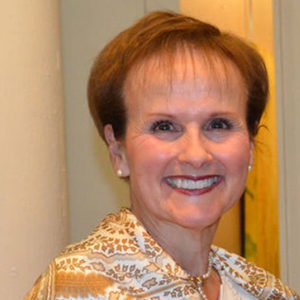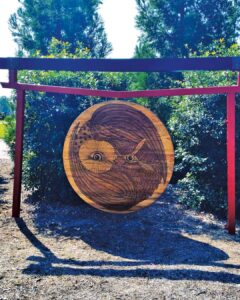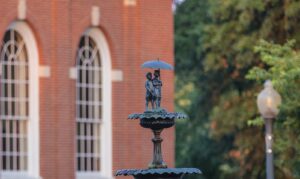
It takes remarkable achievement to have a prominent building named after you. Lessie B. Price credits her success to a philosophy she learned from her father. According to Lessie, her father would often say, “Whatever job you have, do it well and do it with swiftness.”
It was this same philosophy that propelled Lessie’s career at the Savannah River Site (SRS). It has also helped form this political pioneer into one of the most respected women in South Carolina.
Lessie was born in Barnwell County. As a preschooler, this sharecropper’s daughter learned to count and make change at the farmer’s market by handling her father’s produce sales. By the time she entered first grade, she was academically far ahead of her peers. As a result, she was accelerated from the first grade into the third grade by the end of the first week of school.
Her family moved to Aiken because her parents wanted a better life for their ten children. She continued to do well academically and entered Allen University in Columbia, South Carolina at the age of 17.
Lessie’s interest in politics began at an early age. While she was in elementary school, she assisted with voter registration activities. According to Lessie, “Adults were too busy working and my choir director, Barbara Paige Walker, asked me to help.” Ms. Walker is remembered as a driving force during the Civil Rights movement in Aiken.
The move to Aiken provided Lessie with numerous opportunities, including the chance to speak to a handsome college student named William C. Price. William lived next door to Lessie’s best friend, and one rainy day Lessie asked him to take her home in his car. It wasn’t too long before the young couple began dating and subsequently married.
The newlyweds began a family and Lessie looked for full-time work. In 1967 she was hired by SRS as a mail clerk. While qualified for a higher-level position, she was happy just to have a job, and she began to sort and deliver mail efficiently on her designated route. Before long she was given a second route because of the expediency with which she completed her task.
In 1975, Lessie decided to further her education by entering USC Aiken. Going back to school while working full-time with a family was possible because of close family support. William said, “Our family was a big help. Also, the boys were in school close to me. I was generally able to leave at the same time they got off from school.”
Lessie’s initiative led to a variety of SRS positions of increasing importance. There were times when she was the first minority assigned to a work area. It wasn’t always easy, but Lessie’s work ethic and personality won over her peers. When asked about minority acceptance, Lessie said, “When there is conflict, I don’t believe in responding with the same type of venom. I believe in kindness.” She also credits great SRS leaders who supported her and other minorities during her 40-year career.
As Lessie’s career soared, so did William’s career as an educator. He holds the distinction of being the only alumnus of the Martha B. Schofield School to return as principal. He was called upon to serve at a variety of middle and high schools. He held a leadership role at the Area 1 Aiken County Public School District Office until he retired.
William’s retirement turned out to be short-lived. Reverend Doug Slaughter asked him to take over the Second Baptist Christian Preparatory School. William says with a smile, “I told them I don’t wipe noses or change diapers. I am used to high school students.”
Despite his initial protests, William agreed to take the position for a few months. When he retired for the second time, he had lovingly given 10 years of service to a school that served children from 3 years to fifth grade. His time at Second Baptist Christian Preparatory School is one he remembers with fondness and pride.
William’s grandmother instilled in him a desire to make a better life for himself by getting a sound education. This became his passion for every student he encountered. In 2016, William was inducted into the Claflin University Hall of Fame for his outstanding leadership and achievements in education.
While working at SRS, Lessie decided to run for the Aiken City Council because someone needed to address the wide variety of problems, such as potholes and delayed trash pickup, that caused citizen frustration. She was defeated in her first race, but rather than be deterred, she became more involved. In 1987, Lessie was elected as the first woman on the Aiken City Council. This is a position she has retained for over 33 years. She also serves as Mayor Pro Tempore of Aiken.
She is quick to point out that she has worked with many visionary leaders at the local, state, and national levels. While keeping the best interest of her constituents at heart, she also championed new and continuing missions at SRS.
Lessie’s natural leadership abilities have been recognized at the state level. In 1995, she was elected by her peers to become the President of the Municipal Association of South Carolina, which represents 270 cities.
Lessie’s work at the national level is based on her Aiken roots. She worked on the South Carolina gubernatorial campaign of Dick Riley in Aiken County, which he successfully carried. In turn, Governor Riley campaigned on Lessie’s behalf when she ran for City Council. A few years later, the governor was appointed Secretary of the US Department of Education. Secretary Riley called upon his friend Lessie Price to serve on the National School to Work Board. Using her influence to help our community, she spearheaded numerous initiatives, including a program to allow high school students to work part-time in a real work setting at SRS.
Lessie hosted President Clinton during his visits to Aiken and was even invited to a dinner with Vice President Al Gore and all of the US Ambassadors. One might wonder how a shy farm girl grew up to enjoy these kinds of opportunities? Lessie said, “I had to learn to be aggressive if I wanted to get something done.” When asked about her seemingly unending energy, William is quick to say, “She is high octane!”
Lessie smiles as she says, “I have never forgotten the importance of counting. I first learned how to count at the farmer’s market If I want something done, I will talk until I can count on having all the votes I need to make it happen.”
The Price home has many awards from their combined accomplishments, and they have many, many more in storage. While the awards take up some room, pictures of the Price family over the years are most prominent. William and Lessie are quick to say their greatest achievements are their five sons. While each is accomplished in his own field, their oldest son, Tony, works at SRS. Since William’s father also worked at SRS, Tony is a third generation SRS employee.
As a couple, they rely on their faith. Over the years, many people who needed a safe haven have come to live in their home. Some came for a weekend, while others stayed much longer. If there was a need, Lessie and William were willing to lend a hand.
William is fully retired but is an active Rotarian and always available to answer a friend in need. He explained, “Faith has grounded me. I believe in a higher power and you create problems when you stray. I believe we should try to make this world a better place than you find it.”
Today, Lessie serves as Manager of Government Affairs and Community Relations for Amentum, the parent company of Savannah River Remediation. She says, “Time is important to me. I am always thinking. How can I bring people together? What can I do to find the next solution?”
It is impossible to measure how many lives have been touched by the work of this busy couple. Today, the Lessie B. Price Aiken Senior & Youth Center in Aiken serves as a true testament to her adherence to her father’s advice to do a job “well and with swiftness.”
























